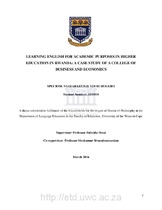| dc.description.abstract | Findings also indicate other drawbacks such as some teachers' transmission of errors due to their low proficiency in the English language, their lack of common and well-designed EAP curricula, their lack of cooperation with non-language teachers, their delayed starting of classes and allowing a kind of laissez-faire and laissez-aller approach in classrooms, their lack of promotion of students' learning autonomy and problem-solving skills, their lack of language support to students, to cite but a few. Findings also indicate that teachers over-used pre-established materials that they had been recommended to use, using a teaching methodology known as PPP (Present Practise Produce) according to which teachers present an item or a skill and students are required to practise it before they become conversant with it. Furthermore, findings indicate a severe shortage of teaching and learning facilities. Findings concerning the language of instruction (English) indicate that it challenged students with an educational background in French. However, the students' French background and the widespread use of Kinyarwanda were also seen as an impediment to the implementation of EAP courses, but findings show that the shift from English to Kinyarwanda would help students understand the difficult concepts used in their academic subjects and safeguard Rwandan culture. Findings with regard to students' needs and expectations indicate that no opportunities were created for classroom interaction to enable students to think critically and comprehend the world and the word. Furthermore, teachers would fail to adjust the teaching and learning materials to suit students' needs. These materials were neither discipline-nor culture-related. To address the above-mentioned shortcomings, findings indicate that teaching and learning materials which incorporate discipline-related terminologies, Rwandan cultural artifacts, and world Englishes bear meaningful input and can raise students' motivation. They also indicate that students communicate better in Kinyarwanda and that the use of code switching helps students acquire both Basic Interpersonal Communication Skills (BICS) and Cognitive Academic Language proficiency (CALP). Concerning the above findings, therefore, recommendations are made to help the CBE and other institutions of higher learning in Rwanda and tertiary education settings in non-native English-speaking countries around the world to use EAP courses as a solution to students' language- related problems. Such recommendations are, to cite a few, teachers' shift from a banking to a problem-solving model of education, their switch to modes of communication other than the language of instruction to facilitate the teaching and learning process, teacher and student autonomy, accommodating students' voice in the teaching and learning process, the revision of criteria relied on to select language teachers, and in-service training for novice teachers. Other recommendations are CBE's partnership with other institutions of higher learning nationwide and worldwide, provision of learning and teaching materials, the government's mass consultation before the promulgation and implementation of any language policy, and the consideration of student errors as part of the learning process. | en_US |

